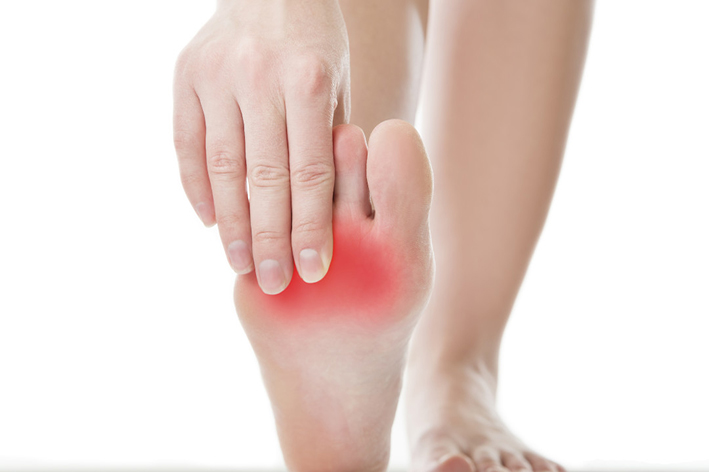DIABETIC NEUROPATHY OVERVIEW
Neuropathy is the medical term for nerve damage. Neuropathy is a common complication of type 1 and type 2 diabetes; up to 26 percent of people with type 2 diabetes have evidence of nerve damage at the time that diabetes is diagnosed. A generalized type of neuropathy, known as polyneuropathy, is the most common type of diabetic neuropathy. Other types of neuropathy can also affect people with diabetes, but will not be discussed here.
Signs and symptoms of diabetic neuropathy include loss of sensation and/or burning pain in the feet. Early detection of diabetes and tight control of blood sugar levels may reduce the risk of developing diabetic neuropathy.
Treatments for diabetic neuropathy are available, and include several elements: control of blood glucose levels, prevention of injury, and control of painful symptoms.
DIABETIC NEUROPATHY RISK FACTORS
In people with type 1 or type 2 diabetes, the biggest risk factor for developing diabetic neuropathy is having high blood sugar levels over time.
Other factors can further increase the risk of developing diabetic neuropathy, including:
- Coronary artery disease
- Increased triglyceride levels
- Being overweight (a body mass index >24)
- Smoking
- High blood pressure
DIABETIC NEUROPATHY SYMPTOMS
The most common symptoms of diabetic neuropathy include pain, burning, tingling, or numbness in the toes or feet, and extreme sensitivity to light touch. The pain may be worst at rest and improve with activity, such as walking. Some people initially have intensely painful feet while others have few or no symptoms.
Diabetic neuropathy usually affects both sides of the body. Symptoms are usually noticed first in the toes. If the disease progresses, symptoms may gradually move up the legs; if the mid-calves are affected, symptoms may develop in the hands. Over time, the ability to sense pain may be lost, which greatly increases the risk of injury.

Potential complications
As you lose the ability to sense pain or hot and cold, your risk of injuring your feet increases. Injuries that would normally cause pain (eg, stepping on a splinter, wearing shoes that create a blister, developing an ingrown toenail) do not necessarily cause pain if you have neuropathy. Unless you inspect your feet on a daily basis, a small injury has the potential to develop into a large ulcer. One of the most serious complications of foot ulcers is the need for amputation of a toe, or in extreme cases, the foot itself.
DIABETIC NEUROPATHY TESTS
Diabetic neuropathy is diagnosed based upon a medical history and physical examination of the feet. During an examination, there may be signs of nerve injury, including:
- Loss of the ability to sense vibration and movement in the toes or feet (eg, when the toe is moved up or down)
- Loss of the ability to sense pain, light touch and temperature in the toes or feet
- Loss or reduction of the Achilles tendon reflex
More extensive testing, including nerve conduction studies, nerve biopsy, or imaging tests (eg, x-ray or CT scan), is not usually needed to diagnose diabetic neuropathy.
DIABETIC NEUROPATHY TREATMENT
There are three main components of diabetic neuropathy treatment:
- Tight control of blood sugar levels
- Care for the feet to prevent complications
- Control of pain caused by neuropathy
Although there is no cure for diabetic neuropathy, use of these treatments can improve painful symptoms and prevent complications.
Download pdf
Download Powerpoint